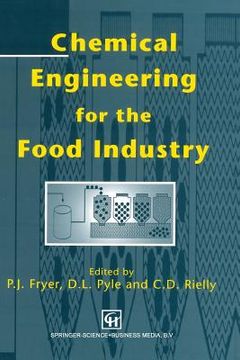Share
Chemical Engineering for the Food Industry (in English)
D. Leo Pyle
(Author)
·
Peter J. Fryer
(Author)
·
Chris D. Reilly
(Author)
·
Springer
· Paperback
Chemical Engineering for the Food Industry (in English) - Pyle, D. Leo ; Fryer, Peter J. ; Reilly, Chris D.
$ 52.09
$ 54.99
You save: $ 2.90
Choose the list to add your product or create one New List
✓ Product added successfully to the Wishlist.
Go to My WishlistsIt will be shipped from our warehouse between
Friday, June 21 and
Monday, June 24.
You will receive it anywhere in United States between 1 and 3 business days after shipment.
Synopsis "Chemical Engineering for the Food Industry (in English)"
Industrial food processing involves the production of added value foods on a large scale; these foods are made by mixing and processing different ingredients in a prescribed way. The food industry, historically, has not designed its processes in an engineering sense, i.e. by understanding the physical and chemical principles which govern the operation of the plant and then using those principles to develop a process. Rather, processes have been 'designed' by purchasing equipment from a range of suppliers and then connecting that equipment together to form a complete process. When the process being run has essentially been scaled up from the kitchen then this may not matter. However, there are limits to the approach. - As the industry becomes more sophisticated, and economies of scale are exploited, then the size of plant reaches a scale where systematic design techniques are needed. - The range of processes and products made by the food industry has increased to include foods which have no kitchen counterpart, such as low-fat spreads. - It is vital to ensure the quality and safety of the product. - Plant must be flexible and able to cope with the need to make a variety of products from a range of ingredients. This is especially important as markets evolve with time. - The traditional design process cannot readily handle multi-product and multi-stream operations. - Processes must be energetically efficient and meet modern environmen- tal standards.
- 0% (0)
- 0% (0)
- 0% (0)
- 0% (0)
- 0% (0)
All books in our catalog are Original.
The book is written in English.
The binding of this edition is Paperback.
✓ Producto agregado correctamente al carro, Ir a Pagar.

